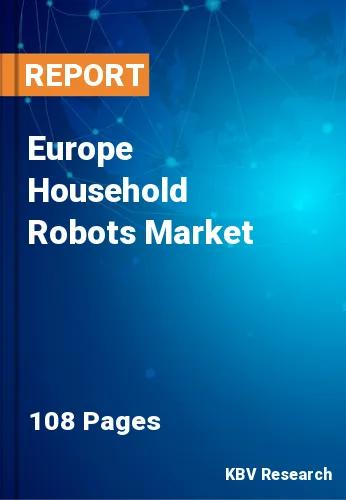The Europe Household Robots Market would witness market growth of 14.8% CAGR during the forecast period (2022-2028).
Social communication is performed by social robots. Elderly and disabled residents employ domestic humanoid robots to provide them companionship. Home telepresence robots allow for communication with individuals in distant areas using a speaker, camera, and microphone. Network robots connect ubiquitous networks with robots, enabling the development of new lifestyles and approaches to a range of societal issues, such as population aging and nursing care.
Robotic machines made specifically for managing a variety of household duties are called household robots. While so, some of these gadgets specialize in chores like housekeeping, others are made to keep the elderly company, watch over small children, and control kitchen appliances. The quantity and variety of robots that are really in use today are fairly limited, but Al businesses are actively working on ideas for robots that have a wider range of capabilities.
The smart vacuum is the most widely used home robot on the market right now. These kinds of home robots can move about a room's floor and clean different sorts of floors, including carpet and hardwood. When necessary, the robot may change course by using sensors to detect the presence of furniture and other items. The robot is compact and very simple, taking up far less storage room than a conventional vacuum cleaner. These kinds of robots often run on a battery pack that is simple to recharge using home power.
Spanish exporters have significant opportunities to compete in the robotics and automation industries. Spain is the tenth-largest market and the fourth-largest market in Europe. In Spain, there were 5,266 new robot installations in 2018, and future years are expected to see an increase in that number. For every 100,000 workers, Spanish companies use 160 robots. 53% of Spanish organizations are now using robotic automation installation methods. As a result, the area is highlighted as being crucial to the growth of the market for Household robots.
The Germany market dominated the Europe Household Robots Market by Country in 2021; thereby, achieving a market value of $1,298.6 million by 2028. The UK market is anticipated to grow at a CAGR of 13.9% during (2022 - 2028). Additionally, The France market would experience a CAGR of 15.7% during (2022 - 2028).
Based on Offering, the market is segmented into Products and Services. Based on Type, the market is segmented into Domestic and Entertainment & Leisure. Based on Distribution Channel, the market is segmented into Online and Offline. Based on Application, the market is segmented into Vacuuming, Lawn Mowing, Pool Cleaning, Companionship, Elderly Assistance & Handicap Assistance, Robot Toys & Hobby Systems, and Others. Based on countries, the market is segmented into Germany, UK, France, Russia, Spain, Italy, and Rest of Europe.
Free Valuable Insights: The Global Household Robots Market will Hit $20 Billion by 2028, at a CAGR of 15%
The market research report covers the analysis of key stake holders of the market. Key companies profiled in the report include Samsung Electronics Co., Ltd. (Samsung Group), LG Electronics, Inc. (LG Corporation), iRobot Corporation (Amazon.com, Inc.), Xiaomi Corporation, Ecovacs Robotics Co., Ltd., Deere & Company, Dyson Limited, LEGO Group (KIRKBI A/S), Sharp Corporation and Ubtech Robotics Corp. Ltd.
By Offering
By Type
By Distribution Channel
By Application
By Country
Our team of dedicated experts can provide you with attractive expansion opportunities for your business.

